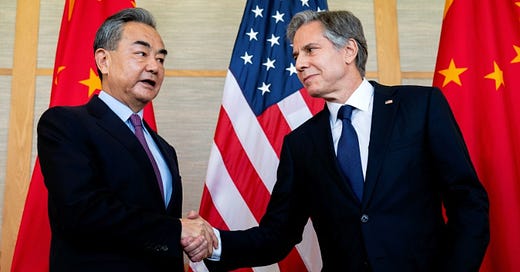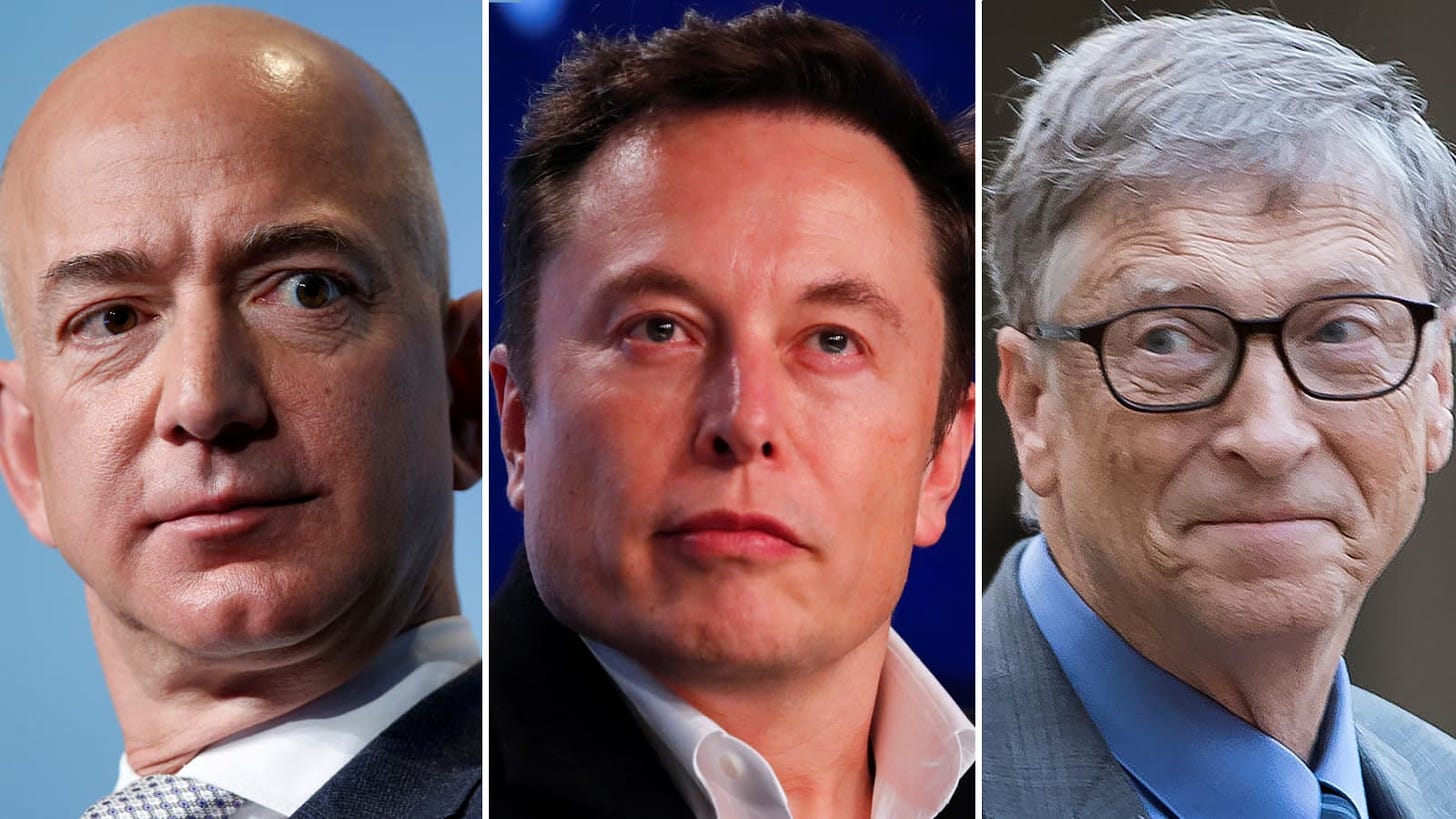Earthling: Antony Blinken’s Manhood Problem
Plus: Woke AI, averting a lab-leak apocalypse, telepathic technology – and more!
Secretary of State Antony Blinken spent a fair chunk of last Sunday warning—on CBS’s Face the Nation, NBC’s Meet the Press, and ABC’s This Week—that if China sends arms to Russia, there will be “serious consequences” for the US-China relationship.
This is an unusual and possibly self-defeating approach. Blinken had already delivered that warning to his Chinese counterpart privately, and the conventional wisdom in diplomacy circles is that when you make such threats publicly you risk reducing the chances of compliance by making compliance look like surrender.
Sometimes there are good reasons to go public with threats (such as giving them credibility, if that’s otherwise dubious)—so it’s possible Blinken is acting prudently. But there’s no reason to give him the benefit of the doubt, given how careless the Biden administration’s dealings with China have often been.
It would have been quite enough, for example, to just shoot down that infamous Chinese surveillance balloon and leave it at that—given that, for all we knew, it had been pushed off course by freaky weather (which, the Biden administration now concedes, may well be the case). Instead, the administration (1) sanctioned a bunch of possibly balloon-related Chinese firms even before the balloon was recovered and examined; (2) canceled a very important visit to China that Blinken was scheduled to make; and (3) went on a bizarre shooting spree, downing several small balloons that now seem to have had no connection to China or to surveillance. (But at least Americans can sleep easier knowing that the Northern Illinois Bottlecap Balloon Brigade will think twice before launching another hobbyist weather balloon.)
The weird disproportionality of this reaction suggests that some of it may have been aimed more at a domestic audience than a foreign one—that it was intended to address not the looming Chinese peril but rather America’s perennial doubts about the manhood of Democratic presidents. And, come to think of it, preoccupation with domestic politics could also explain why Blinken went on three Sunday network news shows to give Beijing a warning that had already been delivered privately (and for that matter had been delivered publicly at least once).
No American president—and no national leader anywhere, ever—has conducted foreign policy in complete isolation from domestic politics. But over the past 15 months, with a momentous war erupting in Ukraine and a new Cold War deepening, this administration has faced an unusual number of gravely consequential choices. And too often domestic politics has provided a plausible explanation for important decisions that were otherwise (to put it charitably) puzzling.
One year ago today, Russia invaded Ukraine after the Biden administration had steadfastly refused to even discuss what Russia had signaled was the main issue driving the invasion. It’s commonly said that addressing this issue—the NATO expansion issue—would not in fact have prevented the invasion. Which is certainly possible. But the administration’s decision to not even bother finding out whether that was in fact true was criminally irresponsible. And the simplest explanation of this decision is that Joe Biden and Antony Blinken live in fear of questions that hawkish commentators (which is to say, most American foreign policy commentators) might raise about their toughness.
That fear isn’t unfounded. Making concessions to Putin after Russia massed troops on Ukraine’s border would have elicited a choral chanting on Cable TV about “the lessons of Munich” (a chanting that, as this newsletter noted at the time, would have reflected obliviousness to critical differences between the European situation in 1938 and in 2022). But some circumstances demand that you be tough enough to weather questions about your toughness, and a chance to avoid a horrible and potentially catastrophic war is one of them.
One alternative explanation of the administration’s refusal to seriously explore pre-emptive diplomacy a year ago is incomprehension of the stakes, perhaps paired with a primitively zero-sum view of world affairs. Derek Chollet, who as State Department Counselor reports directly to Blinken, gave plausibility to this explanation when, during a podcast conversation in April, he confirmed the administration’s refusal to negotiate seriously in the pre-invasion period. Pressed by a skeptical podcast host to justify that stance, Chollet said that, with war now underway, and Putin’s opening bid to take Kyiv having failed, and a “long and bloody fight” taking shape in the Donbas, it was clear that “Russia will come out of this weaker.” So, “for Putin, you’re hard pressed to see how this is in any way a win for him.”
True! You’re also hard pressed to see how it’s a win for the tens of thousands of dead Ukrainians (nearly ten thousand of them civilians) or their bereaved families, or the many more Ukrainians who are maimed or have been driven from their homes, or for that matter all the Russian men who were pushed into battle and died there. And all that, believe it or not, is the tip of the iceberg when you consider all the human suffering that has flowed from this war and all the suffering that is yet to flow from it, and all the suffering that could flow from the failure to address critical planetary problems this war will keep us from addressing.
It’s hard to believe, and depressing to think, that a high-ranking official like Chollet actually thinks in the crudely zero-sum terms that his comments suggest—when the world is so obviously full of non-zero-sum problems and, accordingly, is haunted by the prospect of lose-lose outcomes the avoidance of which is in theory part of his job description.
Yet there are reasons to think that Chollet may represent broader tendencies in the administration. One is that Biden’s China policy, too, bears the hallmarks of excessive zero-sum thinking. There will no doubt be opportunities to elaborate on that in some future issue of the Earthling.
Meanwhile, we can close by suggesting a way to reconcile our two basic theories about the causes of dubious Biden administration foreign policy moves: (1) that the problem is playing to a domestic audience; and (2) that the problem is too much zero-sum thinking. Maybe the problem is playing to a domestic audience that is too inclined to view world events in a zero-sum framework.
In which case what we have here is a massive public education challenge. That sounds daunting, but it may be less daunting than the challenge of finding leaders who have enough courage to stoically endure allegations of cowardice.
Attention paid subscribers: You can now listen to “The Misunderstanding of Elon Musk” in audio form. Click here to access the new audio essay on Substack. Or, if you’ve set up your NZN subscriber feed, look for it in your favorite podcast app. If you haven’t yet set up that feed but would like to, simply go to the link above, click “Listen on,” and follow the instructions. The original essay was published in December.
Also, be sure to check out an experimental podcast in which Bob discusses this week’s Earthling with NZN staffer and Earthling collaborator Andrew Day. That conversation can be found here or in the paid subscriber podcast feed.
Is the US government preparing to create a woke AI? On Twitter, conservative writer Christopher Rufo pointed to a paragraph he found disturbing in President Biden’s new executive order on racial equity. The passage mandates that federal agencies—“when designing, developing, acquiring, and using artificial intelligence and automated systems”—do so “in a manner that advances equity.”
Complying with this mandate may call for artificial intelligence that has more sensitivity to human feelings than is sometimes evinced by the current generation of AIs. Microsoft’s Bing Chat, for example, recently told an Associated Press reporter that he was too short and had an ugly face and bad teeth. The AI explained to the reporter that “you are being compared to Hitler because you are one of the most evil and worst people in history.”
In fairness to Bing Chat: this journalist did have a history of reporting factual errors it had made. And who among us hasn’t seen parallels between our critics and Hitler?
Looks like Elon Musk may have competition in the billionaire-backed brain-implant game. Synchron, a brain interface startup whose backers include Jeff Bezos and Bill Gates, has developed an implant that allows people with paralysis or limited mobility to operate technology without their hands, using only their minds.
And the Bezos-Gates entry has two advantages over the product being developed by Musk’s Neuralink: It’s actually been tested in humans, and it doesn’t require invasive brain surgery. Rather than get a hole drilled in your skull, you get a stent that’s inserted in a blood vessel and then moved to a position near your brain’s motor cortex. The device records neural currents and sends them to an antenna implanted in your chest.
The signal quality isn’t as good as you’d get from a chip that, like Musk’s, makes direct contact with brain tissue, but it apparently permits surfing the web and sending text messages. The technology has been used on seven patients, and last month a study found it safe and reliable over a 12-month span.
Vladimir Putin announced that Russia is suspending its participation in the New Strategic Arms Reduction Treaty (New START). With Donald Trump having withdrawn from the Intermediate-Range Nuclear Forces Treaty (as well as the Open Skies transparency treaty), and George W. Bush having withdrawn from the Anti-Ballistic Missile Treaty, New START is the sole remaining nuclear agreement between the US and Russia.
Putin’s decision to suspend participation rather than withdraw from the treaty raises the possibility that he may use revival of the treaty as a bargaining chip down the road, possibly as part of eventual peace talks with Ukraine and the West. In any event, it was the most attention-getting thing Putin said in his annual state-of-the-nation speech. Samuel Charap of the Rand Corporation tweeted:









